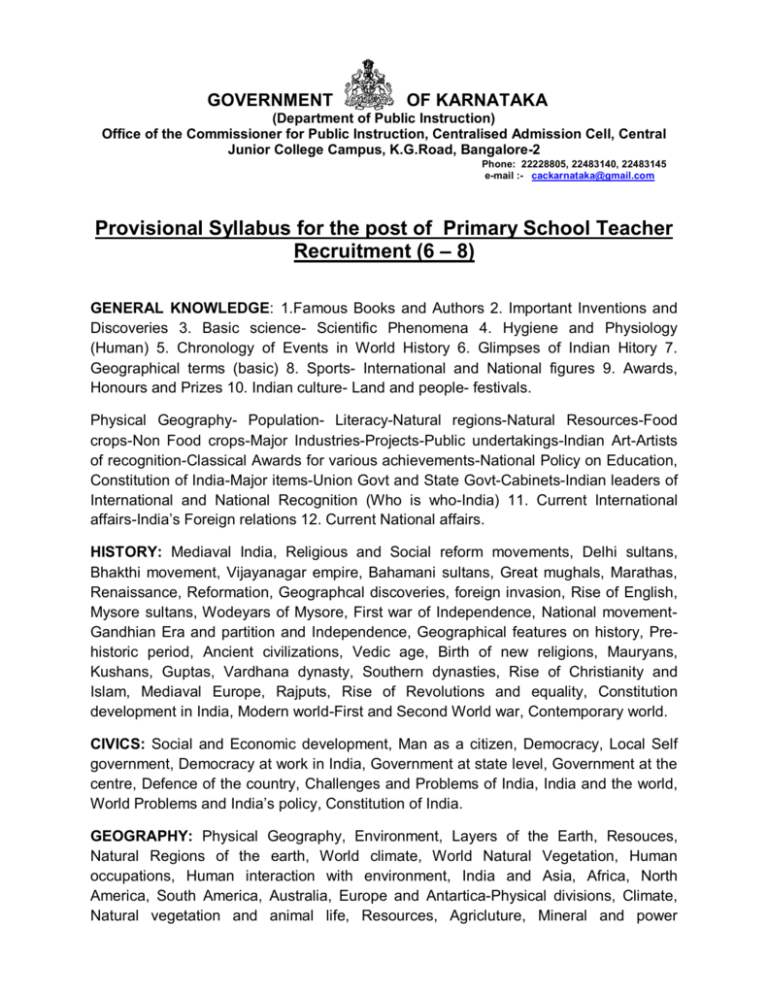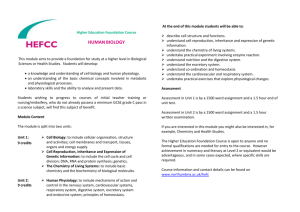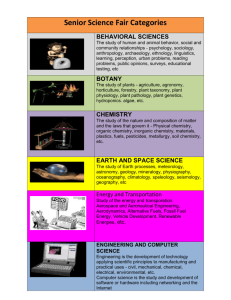Provisional Syllabus for the post of Primary School Teacher
advertisement

GOVERNMENT OF KARNATAKA (Department of Public Instruction) Office of the Commissioner for Public Instruction, Centralised Admission Cell, Central Junior College Campus, K.G.Road, Bangalore-2 Phone: 22228805, 22483140, 22483145 e-mail :- cackarnataka@gmail.com Provisional Syllabus for the post of Primary School Teacher Recruitment (6 – 8) GENERAL KNOWLEDGE: 1.Famous Books and Authors 2. Important Inventions and Discoveries 3. Basic science- Scientific Phenomena 4. Hygiene and Physiology (Human) 5. Chronology of Events in World History 6. Glimpses of Indian Hitory 7. Geographical terms (basic) 8. Sports- International and National figures 9. Awards, Honours and Prizes 10. Indian culture- Land and people- festivals. Physical Geography- Population- Literacy-Natural regions-Natural Resources-Food crops-Non Food crops-Major Industries-Projects-Public undertakings-Indian Art-Artists of recognition-Classical Awards for various achievements-National Policy on Education, Constitution of India-Major items-Union Govt and State Govt-Cabinets-Indian leaders of International and National Recognition (Who is who-India) 11. Current International affairs-India’s Foreign relations 12. Current National affairs. HISTORY: Mediaval India, Religious and Social reform movements, Delhi sultans, Bhakthi movement, Vijayanagar empire, Bahamani sultans, Great mughals, Marathas, Renaissance, Reformation, Geographcal discoveries, foreign invasion, Rise of English, Mysore sultans, Wodeyars of Mysore, First war of Independence, National movementGandhian Era and partition and Independence, Geographical features on history, Prehistoric period, Ancient civilizations, Vedic age, Birth of new religions, Mauryans, Kushans, Guptas, Vardhana dynasty, Southern dynasties, Rise of Christianity and Islam, Mediaval Europe, Rajputs, Rise of Revolutions and equality, Constitution development in India, Modern world-First and Second World war, Contemporary world. CIVICS: Social and Economic development, Man as a citizen, Democracy, Local Self government, Democracy at work in India, Government at state level, Government at the centre, Defence of the country, Challenges and Problems of India, India and the world, World Problems and India’s policy, Constitution of India. GEOGRAPHY: Physical Geography, Environment, Layers of the Earth, Resouces, Natural Regions of the earth, World climate, World Natural Vegetation, Human occupations, Human interaction with environment, India and Asia, Africa, North America, South America, Australia, Europe and Antartica-Physical divisions, Climate, Natural vegetation and animal life, Resources, Agricluture, Mineral and power resources, Industrial Development, atmosphere, Universe. Transport and Communication, Layers of ECONOMICS: Economics-Meaning and Definition, Basic concepts, National Income, Forms of Economic system, Institutional Set up, Infrastructure of Indian Economy, IndiaAgriculture development, Relation between Agriculture and Industry, Trade-Domestic and Foreign Trade of India, State and Economic development. PHYSICS: Mechanics, Properties of matter, Heat and Thermodynamics, Waves, Sound, Light, Optics, Electricity and Magnetism, Electronics and modern physics. Theory of active and passive networks and devices, filters, power supply. Digital electronics. Atomic Spectroscopy, Atomic structure, charge, mass and e/m. Molecular spectra, Lasers and masers. X-rays and crystal structure. Free electronic theory, semiconductors- Band theory. Magnetic materials. Quantum mechanics: Wave mechanics, matter waves, Eigen functions, Schrodinger wave function. Special theory of relativity, Lorentz contraction, time dilation, Doppler effect, Ultimate speed. Aberration, variation of mass. Properties of nucleus, detectors, accelerators, nuclear decays, Nuclear models, Fission and Fusion, Nuclear reactionsbinding energy, Cosmic rays, fundamental particals. CHEMISTRY Chemistry:INORGANIC CHEMISTRY:Atomic structure, periodic table, chemical bonding, metallurgy, d-block elements, f-block elements, co-ordination chemistry, industrial chemistry, analytical chemistry. PHYSICAL CHEMISTRY: Gases, Colloids, Surface Chemistry, Thermodynamics, Nuclear Chemistry, Electro Chemistry, Indicators. ORGANIC CHEMISTRY: Alkanes, Alkenes and Alkynes-IUPAC nomenclature, Isomerism, Functional groups Aromaticity, Vitamins, Hormones, Alkaloids, Carbohydrates. BIOLOGY BIOLOGY: Living World, Cytology, Micro Organisms, Life Processes, Food Production and Management, Environmental Science NON-CHORDATA: PHYLUM: Protozoa, Porifera, Cnidaria, Acnidaria, Platyhelminthes, Aschelminthes, Annelida, Arthropoda, Mollusca, Echinodermata CHORDATA: Characteristic features of chordate. Outline classification and identifying features of Prochordata (Urochordata, Hemichordata and ephalchordata) and vertebrata salient features of Agnatha with examples. Pisces, Amphibia, Reptilia, Aves, Mammalia. CELL BIOLOGY: Cell and its Organelles, Mitosis and Meiosis, Fertilization, Parthenogenesis, Sex Determination, Sex determination in Man, Genetics. BIOCHEMISTRY AND PHYSIOLOGY: Carbohydrates, Proteins, Lipids, Vitamins, Enzymes, Physiology, Histology, Environmental Biology, Terrestrial Ecology. MENTAL ABILITY: Analogy, Classification test, Blood relation test, Series completion test, Direction source test, Alphabet test, Abstract reasoning test, Logic test, Verification test, Coding and decoding test. EDUCATIONAL PSYCHOLOGY: Meaning and methods of Educational Psychology, Growth and Development, Individual Difference, Learning, Personality and Mental Health, Group Dynamics. GENERAL ENGLISH OF STD. 12 : Pronunciation, Spelling, Parts of Speech, Time and Tense, Modals, Prepositions, Articles, Phrasal Verbs, Reported Speech, Agreement, Grammar and Usage, Functional English, Synonyms, Antonyms, Idioms and Phrases, Prefixes and Suffixes, Error Detection, Comprehension, Cloze, Shuffling Sentence Parts, Shuffling sentences in Paragraphs, Testing and Evaluation, Methods/Techniques, ELT terms. COMPUTER KNOWLEDGE: Knowledge of - MS Word - Power Point Presentation - Excel - Outlook - MS Office - Internet surfing - Sending/receiving e-mails - How to write e-mails - Check the net for appropriate content - Attach and download files - Create folders, files and managing them - Printing documents - Formatting - The files-font, margins, header, footer, page numbers, diagrams, inserting symbols and pictures, tables etc - Knowledge of - Operating system like windows (older and latest version) Above syllabus is subject to approval by Competent Authority at Government of Karnataka






